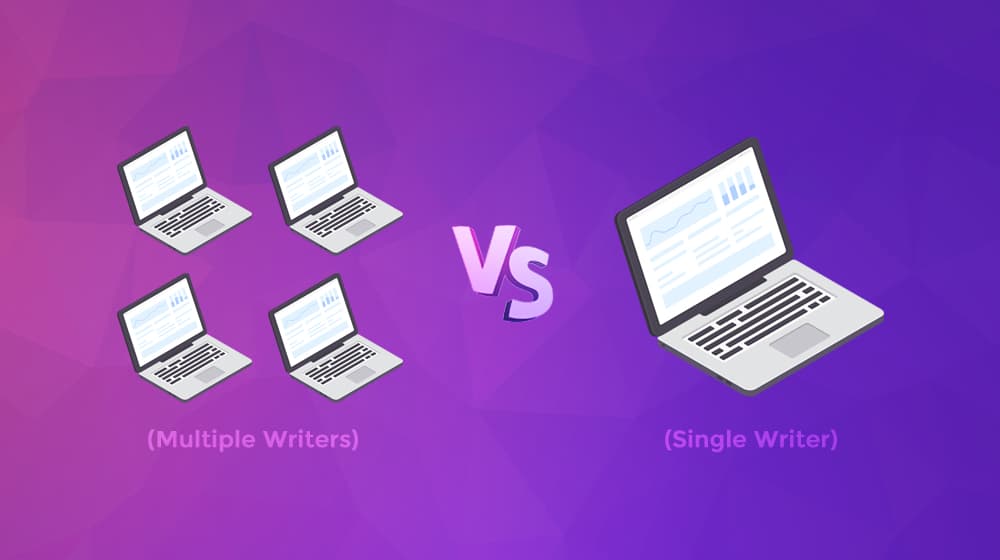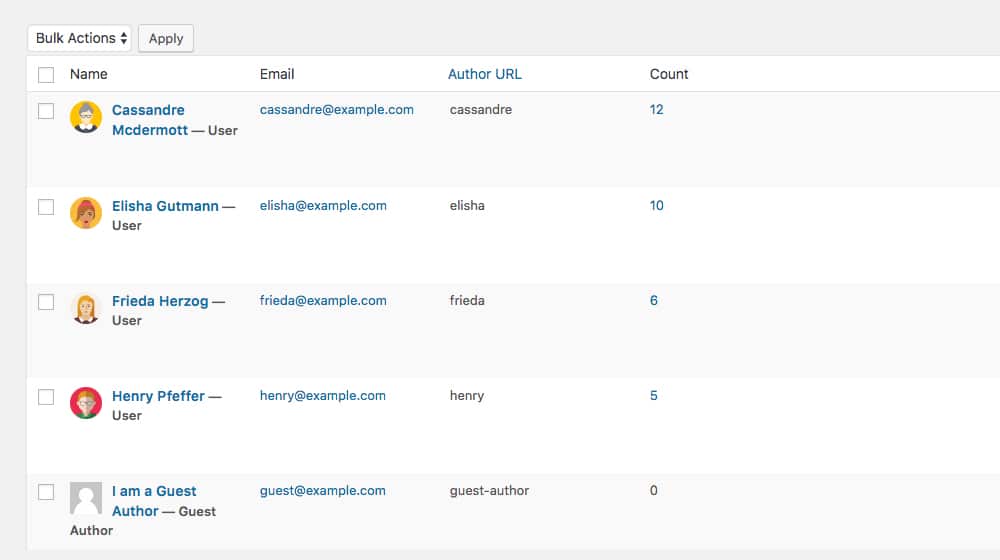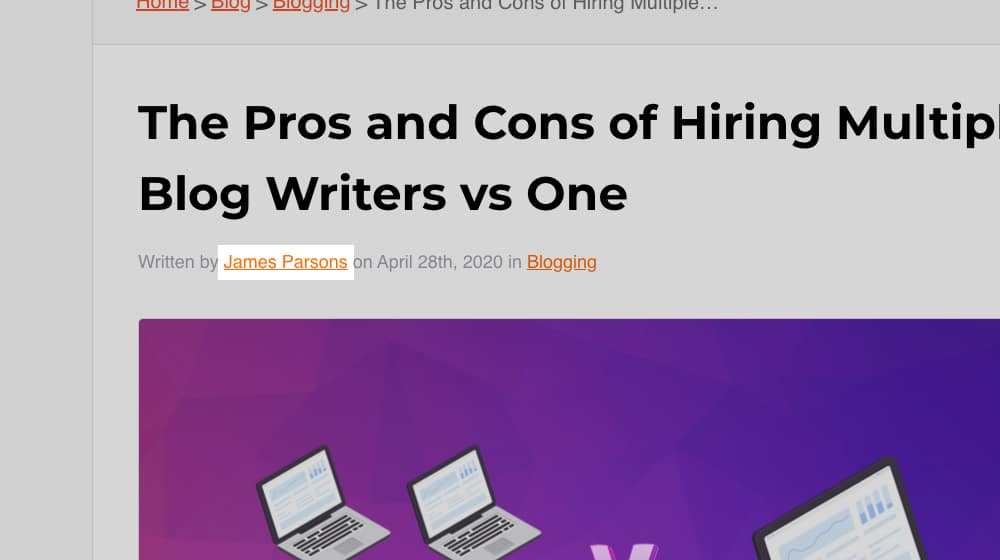The Pros and Cons of Hiring Multiple Blog Writers vs One

Blog writing is one of the most commonly outsourced parts of marketing, between blog management companies, ghostwriters, freelance bloggers, and bloggers for hire. There are so many different ways you can manage a blog that it becomes difficult to determine just what you should even be doing.
I've been trying to clear the air on some of these topics over the past few months, with articles about how often you should blog, an analysis of how much a writer costs, and what you're getting into if you're looking to hire a blog manager. Now I'm here with the next post in the series: the pros and cons of multi-author blogs.
 30 Second Summary
30 Second Summary
You can choose between having one writer or multiple writers for your blog. If you pick one writer, you'll get consistent content, easy management and simpler payments. But you'll have limits on content volume and risk if your writer becomes unavailable. If you choose multiple writers, you can create more content and get different expert views. You'll also have backup when writers are unavailable. But you'll need to manage more people, deal with varied writing styles and handle complex payment systems. As you grow, you might want to start with one writer and slowly add more authors to build your brand.
First, let's talk about the different ways you might hire writers to write for your blog. There's more to it than just one versus many.
Option 1: One writer alone. This is the simplest option, whether you're the one writing everything, or you're hiring a writer to write all of your content for you. One writer could be you, or it could be a ghostwriter providing content you use with your byline, or it could be one person who has their own byline on content published on your site.
Option 2: Multiple writers under one byline. Some of the most active single-author blogs online are actually multiple people writing content that is all published under the one author's byline. This is essentially a stable of ghostwriters working for one person. A lot of higher-end content produced by content mills ends up in this situation.
Option 3: Multiple writers under multiple bylines. I've known blogs with 4-5 regular contributors, and either none of those are real people, or they are real people that have nothing to do with the actual blog itself. In most cases, those are multiple ghostwriters producing content for the site with different bylines attached to their content in the rotation.

You also, of course, have regular multi-author blogs in this category as well. Any time a blogger hires multiple people to write for their site, giving those people bylines, that's a multi-author blog.
Determining Bylines
Bylines are an important decision you need to make. Regardless of whether it's one author or multiple writing the content, you need to decide if you're going to have one byline or several.
This is the appearance of a single versus multi-author blog, which is different from the actuality of a single or multi-author blog. The actuality is what the bulk of this post is going to be about, but appearances have their own considerations.
If everything on your site is published under your name, you gain a lot of benefits. You become the thought leader that "produced" all of that content. This is great if you're trying to build a personal brand or become a one-man-army powerhouse in your industry, like Neil Patel, who seems to be producing content for a dozen different sites at a time.

Of course, if you don't actually know your stuff and are relying on writers to create your content, you run the risk of being called out as a fraud. Someone like Neil, even if he's hiring ghostwriters, certainly knows his stuff. You want to make sure you know what's important. Remember, content published under your name is content attached to you. If a writer works in political or discriminatory statements, or if they take positions on issues, those positions and those statements are attached to you. Saying "oh but I didn't write this" isn't a great defense when, by all appearances, you did.
A multiple-author blog distributes the thought leadership to multiple people – or "people" if you're using fake personas – and aggregates it under your brand as a whole. This has some benefits; for example, some customers might trust you more because they assume you have an organization full of intelligent, talented people, rather than just being a single powerhouse who could be overwhelmed. A table with four legs is more stable than a table with one, right?
On the other hand, a multi-author blog often takes more management to keep track of everything with publication rotations, details like differences in voice, differences in quality and grammar, scheduling issues and deadlines, and so on. This can be important if you're trying to develop distinct personas.
Whether you want multiple writers under one byline, multiple bylines for one writer's content, or multiple writers under multiple bylines, you need to make that decision. It's easier to shift from a single-author to a multi-author blog than vice versa, so keep that in mind as well.
The Pros and Cons of a Single Writer
Now let's talk about only having one writer for your site. There are some benefits to this, but also some drawbacks, so I'll cover both of them.
Pro: Your content's voice is consistent. Big things like POV, the level of casual versus formal, your overall tone, your formatting, your common turns of phrase; these are all indicators of consistency, and people who follow your blog will grow used to them. Even small things, like the way you start sentences, the punctuation you favor, and the idioms you use inform your overall voice. One writer at the helm makes sure all of this is consistent.
Of course, a talented writer can mimic several different voices and can produce content that scales to multiple author personas, but that takes more effort to manage, so most single-author sites don't do it.
Pro: Your writer will be able to reference older content they produced more easily. They might have a folder with everything they've written for you in it they can search, or they might just remember what they've written and can more easily pull out internal links for posts.

Knowing your older content means it's easier to avoid duplicate or near-duplicate content as well.
Pro: Your writer grows familiar with your style, requirements, and goals. Maybe you want to avoid sales talk, or maybe you like going into details on fringe topics, or maybe you just have particular link/formatting/style requirements. A single writer can learn these and be largely self-reliant, leaving you with more time to do other things.
Pro: You only have to manage a single point of contact. This is why blog managers are so useful; they might have multiple writers, marketers, and content producers on hand, but you only talk to the one representative. It's a lot easier to streamline communications that way.
Pro: Managing things like pay is easier. If you only have one writer to pay, you don't need to worry about paying the right people the right amount of money at the right times. Invoicing makes this somewhat easier, but the more paperwork involved, the harder it can become. This is one of the biggest drawbacks of multiple authors, in my view. Content mills can help with this, but they have their own issues.
We create blog content that converts - not just for ourselves, but for our clients, too.
We pick blog topics like hedge funds pick stocks. Then, we create articles that are 10x better to earn the top spot.
Content marketing has two ingredients - content and marketing. We've earned our black belts in both.
Con: There's an upper limit to the amount of content one person can produce. I wrote about this topic here.

Con: If something happens to your writer, you're stuck. Life events can throw a wrench into all manner of plans. Some can be planned around, like a wedding or a vacation. Others, like a sudden illness, can leave you feeling ghosted. It's difficult to deal with, that's for sure.
Con: Some writers have blind spots in their skillsets. Usually, you can avoid this by having a narrow topic your site covers and looking for writers with experience in that niche, but if you're a more generalist site or if you manage blogs for other companies, you might need multiple writers just to make sure you have the relevant experience on tap.
Now, a lot of the pros and cons of multiple authors are just the pros and cons of a single author site, inverted. However, there are some others you might consider.
Pro: You can scale to higher content volume more easily. The more writers you have, the more content you can produce, until you reach a point where you're publishing multiple times per day. The Huffington Post famously kick-started their fame by publishing nearly one post per minute, building their content library, and covering a wide array of topics to an incredible degree. You won't be able to do that unless you have a ton of funding, but it proves there's no real upper limit.
Pro: Your content flow is more resilient to potential issues. If a writer gets sick, you have other writers to pick up the slack. Between having multiple writers and building up a content backlog, you'll be able to make your content flow resistant to disruption from most possible causes.

Pro: You get a wider range of expertise and individual experiences to draw from. As mentioned above, if you want to cover a variety of different topics, or even the same topic from different angles and with different perspectives, having multiple authors is an undeniable benefit.
Pro: Multi-author blogs can be more attractive for guest contributions from experts. This applies more to the façade than the back-end management, but if you have multiple authors with bylines, your site can be more appealing to guest posts, and if you solicit experts to contribute, they'll be more likely to do so.
Pro: You can use multiple personas to guest post on more sites more frequently. A site might only accept a guest post from a given author once every couple of months, but if you have three different authors, each with their own personas, goals, and expertise, they might all be able to write for that other site. Sure, it's a little disingenuous and might violate guest posting policies, but who would ever know?
Pro: Different authors or personas can specialize in different niches to broaden your site. It might not be believable that one person is an expert in five related topics, but if you have five bylined authors, it's easier to pass the smell test.
Con: You'll have to manage a much more complicated pay system. Managing one writer is easy; managing five is a lot harder, and managing a large stable of them? Well, content mills exist for a reason, and that reason is to take that management out of your hands. A lot of people simply don't want to do it. After all, the point of hiring a writer is so you have time to do other things, which you don't if you're just turning into the accountant for your writers.

Con: Unless you're using a content mill, you'll have a lot of communications to manage. Keeping track of everyone via email, Skype, Zoom, Slack, Discord, or whichever messaging platform your team uses to communicate, can be a lot of work as well.
Con: The quality level of content can vary quite a bit from author to author. Sure, one author can have a bad day, but if you're managing half a dozen of them, inevitably one of them is going to be the worst one, even if their worst is still good. The variable quality can be off-putting for a single byline, as far as readers are concerned.
Con: Finding multiple high-quality authors can be difficult. A lot depends on your budget, too. A single great author can cost as much as three or four authors who are less experienced, so you have to decide where you're going to be spending your money.
What Should You Do?
The decision you make is going to be unique to you, but the way I see it, it depends on your goals and your position in your career.
When you're first starting out and you're a relative unknown, it's worthwhile to run a single author blog with yourself as your byline. Learn, grow, and build a reputation. Whether you're writing the content yourself or you're hiring a writer to do it, your goal here is to build your own personal brand.

Once you have a foothold and are starting to build name recognition and a reputation, you can start adding more "authors" to your site. Adding 1-2 more bylined authors to your site, with one writer in the background making sure all the content is high quality, can be a great place to grow.
Once you've established your site as a place where multiple authorities can write, you can open yourself up to more writers. Hiring another couple of ghostwriters to produce content allows you to boost your volume, but the real goal here is to get real people with their own bylines and their own reputations writing for you. Once you do that, you can start phasing out some of your fake personas and replace them with real people.
From there, what you want to focus on depends on your business goals. You can keep expanding, or you can double down and focus on becoming a narrow niche juggernaut. It's really up to you.



 30 Second Summary
30 Second Summary


August 24, 2020
I started out as a one man show but later on I hired a ghostwriter from Upwork as I can’t keep up anymore. It was definitely an adjustment for me as I am used to do everything alone and letting the ghostwriter adapt to my style of writing was a bit of pain. Where do you usually find good quality of ghostwriters James?
August 24, 2020
Hi Doug! We source our writers from multiple different outlets, job boards, freelance sites, direct applications through our website, and recruiters. We start all of our writers off as part-time workers for training and to get a sense of their speed, writing ability, and ability to follow directions. Sometimes we get lucky and find a great new writer with ease, and other times it takes a few tries before we find somebody that is a cut above the rest. Always hire part time to start and only hire full-time if you're certain that they can do the work that is being asked of them. Oh, and if you find a talented writer, pay them well and never let them go!
April 06, 2021
Any SEO benefit of having multiple authors post content?
April 08, 2021
Hey Tammy!
Assuming that the content quality, consistency, and frequency are all identical between a multi-author and single author blog, I don't think there are any direct SEO benefits.
However, there are a lot of variables to consider.
For example, Google evaluates the "Expertise, Authority, and Trust" of content and authors. If one of your authors is famous for their expertise or authority on the subject, having them write for you may have some direct or indirect benefits. It may just be that their content is of higher quality, though, or that their name itself attracts more links and shares.
I wouldn't sweat it either way, though. Single-author blogs can very easily become multi-author blogs later if you decide to add one down the road. Things like quality and consistency are far more important.
September 23, 2024
It's interesting how Google values expertise. Is one high-authority writer usually better for SEO?
September 27, 2024
Hey Maurice!
You have a great point there! Having one high-authority writer can definitely help with your SEO since Google really values consistency in voice and expertise.
But having multiple writers can also bring in a diversity of content. Different perspectives can draw a wider audience and keep things fresh.
You could even try mixing both approaches. You might use a main high-authority writer but toss in some guest contributors now and then. This way you kind of get the best of both worlds.
Hope this helps! Have you tried experimenting with this before?
October 10, 2024
Did you notice any SEO boost with guest writers
October 15, 2024
Hey Ginette!
I've definitely seen different SEO results when using guest writers. Sometimes there's assistance because of fresh perspectives and new keywords. They can also bring their own audience which helps increase traffic. Is there a specific topic you're hoping to cover? I really enjoy checking out new ideas.
Happy to chat about it! 😊
September 26, 2024
Isn't it hard, though? Famous writers do bring trust, right!
October 03, 2024
Hey Matt!
You have a point there! Famous writers definitely bring trust because people already know them right? But having a mix of different writers can really bring in fresh perspectives and more content. You're right - a single voice is great for consistency but having more writers can kind of attract a wider audience.
How's your latest blogger lineup looking? Are you enjoying shaping your team's voice?
May 21, 2021
I am getting my articles from different writers my articles don't quite sound the same. It's pretty obvious that it came from several people. Nobody has called it out yet but I'm worried, are there any SEO implications of this?
May 26, 2021
Hey Denver!
Oooo... tough question.
This is precisely why I'm not the biggest fan of hiring multiple writers, especially if they're all blogging under the same name.
I'm a bit paranoid when it comes to search engines.
They're generally smarter than we give them credit for, so if you can tell they differ in quality and voice, they can tell.
The only verifiable evidence of this having SEO implications is a quote from John Mueller of Google, who mentioned in a video that if a website has many pages, some of them higher in quality and some of them lower in quality, the lower quality pages could affect how they view the website as a whole.
That doesn't speak much about the "voice" of an article, but if you have several writers all creating content for you, some of those articles are probably better than others. Some might be outright terrible. If you haven't already, you should audit your blog content and check them for plagiarism, grammar, and read them from start to finish to make sure they are adequately addressing the topic and answering all of the reader's questions.
I wrote a good guide on how to do this here, if you're interested: https://www.contentpowered.com/blog/perform-blog-content-audit/
September 26, 2022
I've had a similar experience. Setting a firm set of guidelines on the "voice" helped a lot.
October 07, 2022
Good!
October 10, 2024
How do you keep each writer's style steady? Is it hard?
October 14, 2024
Hey Pete! Keeping each writer's style consistent can sometimes be a little tricky. I use style guides and have dedicated editors to help with this process. Having regular feedback loops also helps us maintain that consistency. Please let me know if you have any more questions! 😊
June 11, 2021
Hello,
You don't think there's any SEO benefit to having multiple writers?
June 11, 2021
Hi Carol!
If it does have any impact on organic performance, it would be a tiny one.
Most SEOs agree that the quality of your content is what matters, not how many authors you have.
If you have two identical sites in parallel universes, one with multiple authors and the other with only one author, the sites will perform almost identically.
There are much better ways to optimize your site and gain an advantage than to add more authors.
October 08, 2024
Does using many voices change the tone a lot?
October 09, 2024
Hey Clemmie!
Having multiple writers can really change up the tone of a blog because each writer has their own way of writing. I've seen this happen with clients on platforms like HubSpot. It might take a bit more editing to keep a consistent brand voice. Are you planning to add more writers to your team? Let me know if you want any tips! 😊